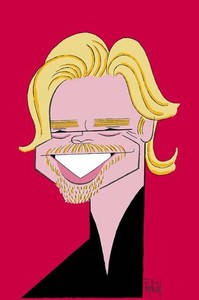Source of caricature: online version of the WSJ interview quoted and cited below.
(p. A13) Governments have long dominated space, starting with the Soviet Union’s 1957 launch of Sputnik 1. The U.S. soon followed. “If they’d used just a small fraction of that money as prize money and given it to the best commercial companies, that money would’ve been far better spent,” Mr. Branson muses. “The $10 million [Ansari] X Prize very much sparked our move into space travel,” he notes, referring to the competition organized by entrepreneur Peter Diamandis and launched in 1996.
Mr. Branson had dreamed of exploring the final frontier for decades. “I think it just simply goes back to watching the moon landing on blurry black-and-white television when I was a teenager and thinking, one day I would go to the moon–and then realizing that governments are not interested in us individuals and creating products that enable us to go into space,” he says. In 1995, after making billions of dollars in the music and airline businesses, Mr. Branson registered a new company, Virgin Galactic (the name “sounded good”), at London’s Companies House. Then the company started searching for rocket scientists and the right technology.
Several years later, in July 2002, Virgin’s team traveled to California to check on American aerospace designer Burt Rutan’s progress on the Virgin Atlantic Global Flyer, a plane built “to circumnavigate the globe non-stop on a single tank of fuel,” according to Virgin’s website. Virgin discovered that Mr. Rutan intended to compete for the X Prize with SpaceShip One, the world’s first privately developed spacecraft, financed by Microsoft co-founder Paul Allen.
Mr. Branson quickly struck a deal: Virgin would license Mr. Rutan’s SpaceShip One technology from Mr. Allen if he won the competition. In 2004, Mr. Rutan did just that, and Virgin Galactic was off to the races.
. . .
So what advice does Mr. Branson have for aspiring entrepreneurs? “Think of what frustrates you–and if you’re frustrated by something and you feel ‘Dammit, if only people could do this better,’ then go try to do it better yourself. It can start off in a really small way . . . and you’ll be surprised: If you’re doing it better yourself, in whatever field it is, you’ll be filling a gap and you suddenly might start creating a business.”
For the full interview, see:
MARY KISSEL. “THE WEEKEND INTERVIEW with Richard Branson; Space: The Next Business Frontier; By next Christmas the airline mogul could be ferrying paying customers outside the atmosphere–and, later, to the bottom of the ocean.” The Wall Street Journal (Sat., December 17, 2011): A13.
(Note: ellipsis added.)


